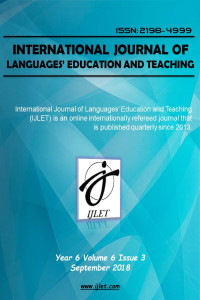Öz
The word cezâ which was borrowed into Turkish language through Koran translations in Karakhanid Turkish means “feedback” in the Koran text. The word gains contextual meanings like “reward” and “recompense” when it is used in positive and negative context. There is a word in Turkish language at that period like yanut which has same semantic field with the word cezâ and common usage. The word cezâ which is used in the meaning both “reward” and “recompense” for a while after borrowing in Turkish language, then underwent a semantic restriction and then evolved to mean only “recompense”. It can be understood that borrowing had played a role in this semantic change as a linguistic factor. It can be asserted that the word cezâ is a prestige borrowing considering the semantic field and usage frequency of the word yanut as a rival in recipient language. The interaction between two words which have same semantic field determined the type of the semantic change. The word cezâ could hold on to language under favour of either being a prestige borrowing due to be borrowed from a holy writ or being pushed into the meaning “punishment” which is gained depends on the context. The dominant role in this pushing belongs to the negative connotation occured in the source text Koran. In this paper, it is asserted that being in interaction with the word yanut had a role in this semantic change in Turkish language as a “borrowing factor”, and one of the main reasons of completing this semantic change process with semantic restriction is the negative connotation of the word cezâ developes out of the elements as context, frequency, discourse etc. in the source text Koran.
Anahtar Kelimeler
Cezâ semantic restriction Koran translations context connotation discourse
Kaynakça
- Aksan, D. (2005). Anlambilim. Ankara: Engin Yayınevi.
- Aldağ, H. (2005). Öğrenme ve Öğretmede A. Paivio’nun İkili Kodlama Kuramı. Ç.Ü. Sosyal Bilimler Enstitüsü Dergisi, 14/2, 29-48.
- Alper, S. (2017). Somut ve Soyut Düşünme Nedir? Ahlaki ve Siyasi Tutumlara Olan Etkileri Nelerdir?. Pivolka. 7/25, 7-9.
- Arat, R. R. (1959). Kutadgu Bilig II-Tercüme, II. Seri, No: 20, Ankara: Türk Dil Kurumu Yayınları.
- ……………………… (1979). Kutadgu Bilig III-İndeks, Haz.: Kemal Eraslan, Osman F. Sertkaya, Nuri Yüce. İstanbul: Türk Kültürünü Araştırma Ensitüsü Yayınları 47. Seri IV, Sayı: A 12.
- ……………………… (1991). Kutadgu Bilig I-Metin, 3. Baskı, Ankara: Türk Dil Kurumu Yayınları.
- Ata, A. (2004). Türkçe İlk Kur’an Tercümesi (Rylands Nüshası) - Karahanlı Türkçesi (Giriş-Metin-Notlar-Dizin). Ankara: Türk Dil Kurumu Yayınları.
- Ayçiçeği, A.; Yüceil, S. (1999). Soyut Kelimeler De Somut Kelimeler Kadar Hatırlanabilir Mi?. İstanbul Üniversitesi Tecrübi Psikoloji Çalışmaları Dergisi, 21, 233-239.
- Bussmann, H. (1996). Routledge Dictionary of Language and Linguistics. Translated by: Gregory P. Trauth&Kerstin Kazzazi. London and New York: Routledge.
- Caferoğlu, A. (2015). Eski Uygur Türkçesi Sözlüğü. 3. Baskı. Ankara: Türk
Öz
Türk diline Karahanlı Türkçesi döneminde Kur’an çevirileri yoluyla girdiği anlaşılan cezâ sözcüğü Kur’an’da “geribildirim” anlamına gelmektedir. Olumlu ve olumsuz bağlamlarda kullanıldığında ise sözcük “ödül” ve “olumsuz yaptırım” şeklinde bağlamsal anlamlar kazanmaktadır. Bu dönemde Türk dilinde, cezâ ile aynı anlam alanına ve yaygın bir kullanıma sahip olan yanut gibi bir sözcük bulunmaktadır. Ödünçlemeden sonra Türk dilinde bu bağlamsal anlamlarıyla kullanılan sözcük daha sonra anlam daralmasına uğrayarak yalnızca “olumsuz yaptırım” ifade eder hâle gelmiştir. Bu anlam değişmesi hadisesinde bir dil-içi faktör olarak ödünçlemenin rolü olduğu görülmektedir. Alıcı dildeki rakibi olarak yanut sözcüğünün semantik alanı ve kullanım sıklığı göz önüne alındığında cezâ sözcüğünün bir prestij ödünçlemesi olduğu iddia edilebilir. Aynı semantik alana sahip olan iki sözcüğün girdiği etkileşim, meydana gelecek semantik değişimin niteliğini belirlemiştir. Cezâ sözcüğü hem kutsal kitap kaynaklı bir prestij ödünçlemesi olması hem de bağlama dayalı olarak kazandığı “olumsuz yaptırım” anlamına itilmesi sayesinde ödünçlendiği dilde tutunabilmiştir. Bu itilmede ana rol, kaynak metin Kur’an’da ortaya çıkan olumsuz konotasyona aittir. Bu çalışmada, ilgili sözcüğün Türk dilinde uğradığı semantik değişmede bir ödünçleme faktörü olarak yanut sözcüğüyle girilen etkileşimin rol oynadığı ve bu semantik değişme sürecinin anlam daralması ile neticelenmesinin ana sebeplerinden birisinin de kaynak metin Kur’an’da bağlam, sıklık, söylem gibi bazı unsurların etkisiyle sözcüğün olumsuz konotasyon bildirmesi olabileceği ileri sürülecektir.
Anahtar Kelimeler
Cezâ anlam daralması Kur’an çevirileri bağlam konotasyon söylem
Kaynakça
- Aksan, D. (2005). Anlambilim. Ankara: Engin Yayınevi.
- Aldağ, H. (2005). Öğrenme ve Öğretmede A. Paivio’nun İkili Kodlama Kuramı. Ç.Ü. Sosyal Bilimler Enstitüsü Dergisi, 14/2, 29-48.
- Alper, S. (2017). Somut ve Soyut Düşünme Nedir? Ahlaki ve Siyasi Tutumlara Olan Etkileri Nelerdir?. Pivolka. 7/25, 7-9.
- Arat, R. R. (1959). Kutadgu Bilig II-Tercüme, II. Seri, No: 20, Ankara: Türk Dil Kurumu Yayınları.
- ……………………… (1979). Kutadgu Bilig III-İndeks, Haz.: Kemal Eraslan, Osman F. Sertkaya, Nuri Yüce. İstanbul: Türk Kültürünü Araştırma Ensitüsü Yayınları 47. Seri IV, Sayı: A 12.
- ……………………… (1991). Kutadgu Bilig I-Metin, 3. Baskı, Ankara: Türk Dil Kurumu Yayınları.
- Ata, A. (2004). Türkçe İlk Kur’an Tercümesi (Rylands Nüshası) - Karahanlı Türkçesi (Giriş-Metin-Notlar-Dizin). Ankara: Türk Dil Kurumu Yayınları.
- Ayçiçeği, A.; Yüceil, S. (1999). Soyut Kelimeler De Somut Kelimeler Kadar Hatırlanabilir Mi?. İstanbul Üniversitesi Tecrübi Psikoloji Çalışmaları Dergisi, 21, 233-239.
- Bussmann, H. (1996). Routledge Dictionary of Language and Linguistics. Translated by: Gregory P. Trauth&Kerstin Kazzazi. London and New York: Routledge.
- Caferoğlu, A. (2015). Eski Uygur Türkçesi Sözlüğü. 3. Baskı. Ankara: Türk
Ayrıntılar
| Birincil Dil | Türkçe |
|---|---|
| Konular | Türk Dili ve Edebiyatı (Diğer) |
| Bölüm | Araştırma Makalesi |
| Yazarlar | |
| Yayımlanma Tarihi | 30 Eylül 2018 |
| Yayımlandığı Sayı | Yıl 2018 Cilt: 6 Sayı: 3 |


